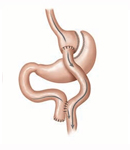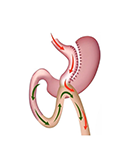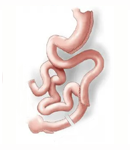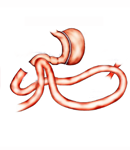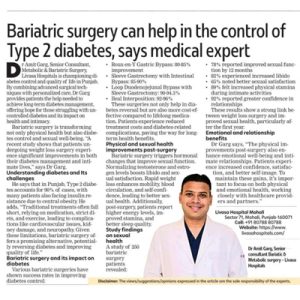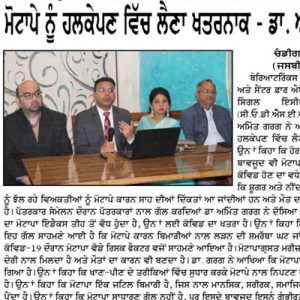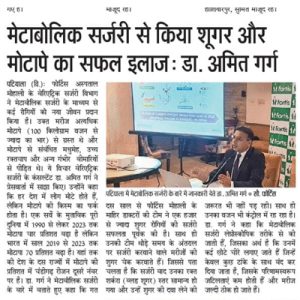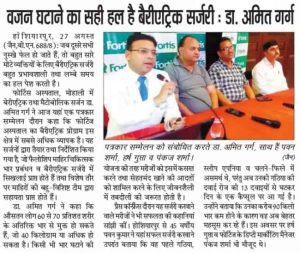This procedure is done laparoscopically and includes 5 ports. It includes laparoscopic sleeve gastrectomy, division of duodenum between D1 and D2, approx 250 cm of jejunal bypass and duodenojejunal anastomosis.
Recovery process after Diabetes Surgery
After undergoing diabetes surgery, patients experience a streamlined recovery process
- Patients are encouraged to walk on the same day as the surgery, promoting mobility and circulation.
- Within six hours post-surgery, patients begin a liquid diet to gradually reintroduce nourishment.
- Typically, patients are discharged from the hospital by the third day, indicating a smooth recovery.
- Following discharge, patients can gradually resume their normal routine activities, marking the transition to post-operative life.
Mechanism of Diabetes Reversal
The mechanism behind how gastric sleeve with intestinal bypass facilitates diabetes reversal is multifaceted
- Gastric sleeve surgery induces calorie restriction, which alleviates the burden on the pancreas. With a reduced load, the pancreas can more effectively match the amount of insulin produced.
- Calorie restriction resulting from the surgery also promotes weight loss, thereby reducing insulin resistance and improving insulin sensitivity.
- Intestinal bypass serves to enhance the incretin effect. By rerouting food to the terminal ileum at a faster pace, this stimulates the release of incretin hormones like GLP1 and PYY, which in turn trigger increased
insulin secretion from the pancreas.
The combined impact of gastric sleeve with intestinal bypass creates a potent synergy, making it a highly effective tool for reversing type 2 diabetes.
Dr Amit Garg
Minimal Access Bariatric
Metabolic & GI Surgeon
LDJB DIABETES SURGERY

Make An Appointment
Call:6283337650
OR
Frequently Asked Questions
Who is a candidate for Diabetes Surgery
Candidates eligible for gastric sleeve with Loop Duodeno Jejunal Bypass, also known as metabolic or diabetes surgery, include:
- Individuals with a BMI exceeding 35 Kg/m2 who are diagnosed with Type 2 diabetes.
- Patients with a BMI greater than 27.5 who exhibit inadequate control of Type 2 diabetes despite undergoing medical therapy.
Advantages of Sleeve Gastrectomy with Loop Duodeno Jejunal Bypass
- Highly effective for reversing diabetes.
- Short duration of surgery, typically around 90 minutes.
- Reduced risk of obstruction or internal hernias.
- Minimal likelihood of malnutrition.
- A physiological procedure, aligning with the body’s natural functions.
Life after Diabetes Surgery
Life after diabetes surgery entails a return to normalcy for patients. Patients are encouraged to commence liquid intake on the same day as the surgery, starting with small sips. Within one month, most patients can transition to a regular diet. Many patients express satisfaction following metabolic surgery, as it often leads to diabetes remission within the first month for a majority of them. The primary goal of metabolic surgery is to achieve an HbA1c level of less than 6.5 without the need for oral medications. For sustained success with sleeve with Loop Duodeno Jejunal Bypass or diabetes surgery, it is crucial to steer clear of high-calorie foods and liquids, prioritizing a high-protein diet coupled with regular exercise.
Cost of Diabetes Surgery
Cost of diabetes surgery in India, particularly in Punjab, varies depending on several factors. At CODSILS Punjab, the average cost typically ranges from 3.5 lakhs to 4.0 lakhs, influenced by factors such as room category and choice of hospital. For detailed information on the cost of bariatric surgery in India, we recommend visiting our page dedicated to this topic.
Side Effects of Diabetes Surgery
Side effects of diabetes surgery may manifest if patients fail to adhere to prescribed dietary guidelines post-surgery. While these procedures are potent tools for diabetes remission, sustaining positive outcomes necessitates a commitment to a healthy lifestyle and dietary habits.
To mitigate side effects, strict adherence to guidelines is imperative, especially in avoiding high-calorie intake for long-term glycemic control. Some common side effects of diabetes surgery include nutritional deficiencies, mild hair loss, anemia, and loose motions. Regular supplementation of essential nutrients such as calcium, multivitamins, proteins, and iron is recommended post-surgery.
Concerns regarding sexual function after metabolic surgery stem from underlying neuropathy and dyslipidemia commonly associated with Type 2 Diabetes. While dyslipidemia resolves post-surgery, neuropathy recovery may take time. Opting for surgery before irreversible damage occurs is advised. Post-surgery, patients often experience improved libido, facilitated by Type 2 Diabetes control. A low-calorie, high-protein diet coupled with regular exercise can further enhance sexual function.
Possibility of Recurrence of Diabetes
The possibility of Type 2 diabetes recurrence post-metabolic surgery is minimal if weight is maintained, along with adherence to diet and exercise regimens. Long-term follow-up studies haven’t reported diabetes recurrence among patients.
Diabetes Surgery to Medical Therapy
When comparing diabetes surgery to medical therapy, both aim to control blood sugars and lower HbA1c levels. However, surgery helps delay disease progression, whereas medical therapy may not prevent diabetes-related complications such as retinopathy, neuropathy, and cardiopathy, as it doesn’t address dyslipidemia. Recent guidelines advocate bariatric surgery as the first-line treatment for individuals with a BMI exceeding 40 Kg/m2 and Type 2 diabetes.
Loop Duodeno Jejunal Bypass PJB Superior to Gastric Sleeve Alone
While gastric sleeve alone can lead to the resolution of Type 2 Diabetes in morbidly obese patients, the addition of intestinal bypass to the sleeve offers enhanced benefits for individuals with poor pancreatic function. This combination aims to increase insulin production and achieve better control of Type 2 Diabetes. Dr. Amit Garg assesses pancreatic function and other relevant parameters to determine whether sleeve gastrectomy alone suffices or if an intestinal bypass is necessary for optimal diabetes management.
Best Hospital for Diabetes Surgery
When considering the best hospital for diabetes surgery in Punjab, it’s essential to select a center equipped to handle the unique needs of patients with poorly controlled diabetes and compromised immunity. Such cases require a multidisciplinary team approach, with all necessary specialists available under one roof. Additionally, the experience of the surgeon plays a pivotal role. Opting for an experienced diabetes surgeon in a reputable multispecialty hospital ensures comprehensive care.
While New Delhi may be sought after by international patients for diabetes surgery, it’s crucial to note that only a select few surgeons perform metabolic surgery for Type 2 Diabetes due to its complexity. Dr. Amit Garg, a Senior Consultant bariatric and metabolic surgeon at Fortis Hospital in Mohali, Punjab, India, stands out as the premier surgeon for diabetes surgery in the country. His team offers affordable packages tailored to patients without insurance coverage, ensuring accessibility to quality care.
Is diabetes surgery considered safe in India?
In the hands of skilled professionals, metabolic procedures are indeed safe. Dr. Amit Garg and his proficient team have effectively performed metabolic surgeries for patients with poorly managed diabetes, hailing from diverse regions across India and abroad. At CODSILS, we adhere strictly to international safety standards throughout the entire surgical process—from pre-surgery preparations to the procedure itself and post-operative care. Utilizing laparoscopic techniques ensures swift recovery, enabling patients to resume their regular activities soon after discharge.
Dr. Amit Garg, hailed as the premier metabolic surgeon in Punjab, is renowned for his expertise in addressing diabetes through surgical means. Serving as a senior consultant at Fortis Hospital in Mohali, Punjab, India, Dr. Garg stands as a trailblazer in the field. His pioneering work includes the introduction of sleeve gastrectomy with Loop Duodeno Jejunal Bypass to India, a procedure that has seen remarkable success in treating Type 2 Diabetes. With an extensive career spanning over more than a decade and half, Dr. Garg has profoundly impacted the lives of thousands, facilitating the reversal of diabetes for many.
Read more...
In 2014, Dr. Garg achieved another milestone by becoming the first surgeon in Punjab, India to perform loop duodenojejunal bypass for Type 2 diabetes in non-obese patients. His dedication to advancing metabolic surgery led him to undergo rigorous training under the esteemed Dr. C. K. Huang at E-DA Hospital in Taiwan.
Founding the Centre of Obesity, Diabetes, and Single Incision Laparoscopic Surgery (CODSILS) in Mohali, India in 2014, Dr. Garg envisioned a hub dedicated to raising awareness and providing specialized care for weight loss and diabetes surgery in the Punjab region. Collaborating with esteemed multispeciality hospitals such as Fortis Hospital, Ivy Hospital, and Shalby Hospital, Dr. Garg has expanded the reach of metabolic surgeries in the area.
For those seeking diabetes reversal or the expertise of a top-notch surgeon for Type 2 diabetes in India, Dr. Amit Garg stands as a singular option in North India. Offering various metabolic procedures tailored to both obese and non-obese patients, Dr. Garg addresses a growing need in the medical community. With the endorsement of global health organizations like the WHO, International Diabetes Federation, and Diabetes UK, metabolic surgery for diabetes has gained widespread recognition. Among these procedures, the sleeve with Loop Duodeno Jejunal Bypass or intestinal bypass emerges as a particularly effective and physiologically sound method for reversing Type 2 diabetes.
Less

Laparoscopic Bariatric & Metabolic Procedures
Bariatric surgery is scientifically proven procedure that aims to help individuals with obesity achieve
significant and sustainable weight loss by altering the digestive system. There are several types of
bariatric procedures, each with its own approach and mechanism of action
Fill our health questionnaire and find out if you are eligible for bariatric surgery
Bariatric Surgery Results
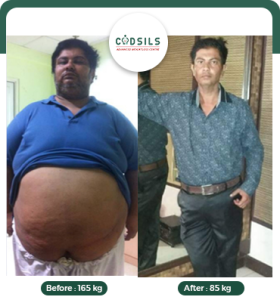

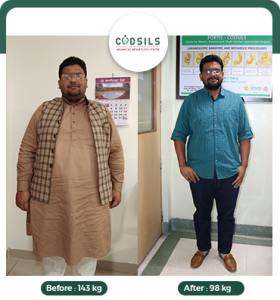



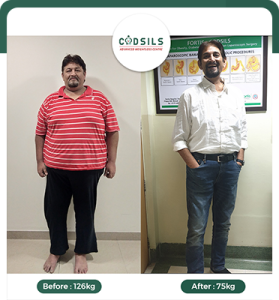




















Bariatric Surgery
Metabolic Surgeries
Laparoscopic GI Surgeries



